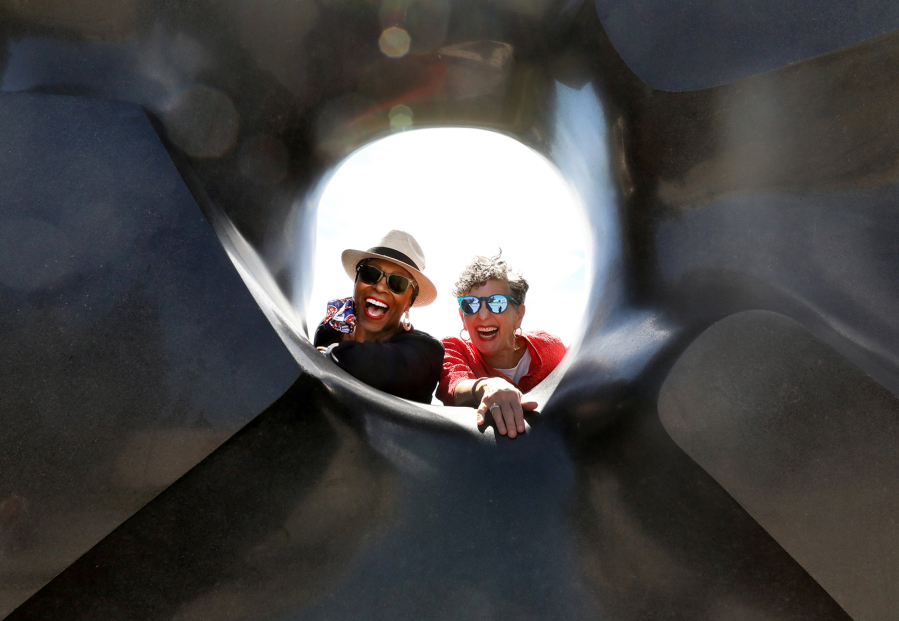SEATTLE — Marcie Sillman retired after 35 years as an arts and culture reporter at radio station KUOW in December 2020, as artists and performers struggled to pay bills without work, galleries and museums sat empty and the art world wondered if things would ever return to normal.
She says her last year at KUOW was sad because the artists she loved were struggling. And she felt a responsibility, even though she was retiring, to keep focusing on the arts community because it was “disproportionately hit by the pandemic in a way that’s not really recognized.”
Sillman reached out to her friend Vivian Phillips, a prominent Seattle arts advocate, and asked if she wanted to start a podcast.
They released the first two episodes of their “DoubleXposure” podcast on June 25. It’s available on Spotify, Apple Podcasts, Google Podcasts and most other audio streaming platforms — there are a lot of bands and podcasts called “DoubleXposure” or “Double Exposure,” so it’s easiest to find the podcast by searching their names — as well as on the website doublexposurepod.com. Sillman and Phillips say the podcast’s goal is to advocate for the essential role of art in society and to make the art world more inclusive. They are using a broad definition of art and plan on having visual artists, musicians, dancers, writers and chefs from the Seattle area on the podcast.
The first two episodes are conversations with author Charles Johnson, a winner of the National Book Award for Fiction, and his daughter, artist and writer Elisheba Johnson. In these episodes, Phillips and Sillman chat with the Johnsons about their book series, “The Adventures of Emery Jones, Boy Science Wonder,” and Wa Na Wari, Elisheba Johnson’s art gallery in the Central District that’s meant to reclaim space for Black people in Seattle’s historically Black neighborhood. Though the format is casual, the women’s backgrounds in communications come through in their well-researched questions. New episodes will be released every other week.
Phillips serves on numerous arts and culture boards in King County and works in arts consulting. But she says she wanted to start the podcast because of her “ever-present curiosity and a desire to always be in conversation with artists and creatives.” She and Sillman say that, in their various public roles, they never had the opportunity to do that on their own terms.
Phillips says one of her main goals in the podcast is to “desegregate the arts from other essential needs” and to frame it as something just as crucial to human life as things like housing and electricity.
“It’s an integral part of everything we do, but we tend to segregate it and make it an add-on,” she says.
Phillips also says her time in the Seattle art world, including her three years as the chair of the Seattle Arts Commission, made her frustrated with the elitism and exclusion — especially of artists of color — that prevails in some art circles. Being a Black woman, she says she’s always pushed for more recognition for artists of color, something she plans to continue with the podcast.
Another one of Phillips’ recent projects is Arte Noire, an online publication she founded focused on highlighting African and African American art and culture. She says, while at the Seattle Arts Commission, she found that many people didn’t respect art coming out of Africa as a legitimate form of contemporary art, and she wants to change that.
Sillman, who’s Jewish American and white, says she’s also consciously highlighted artists of color in her reporting at KUOW. She says that’s not because she rejects white artists, but because there’s plenty of great art made by people of color that’s ignored or marginalized by the art establishment.
Sillman says it’s important for her to “include all voices” not just “establishment white voices” in the podcast.
Phillips and Sillman have known each other for three decades through their involvement in the Seattle arts scene. But Sillman says they got really close three years ago when they were both community advisers for Seattle University’s Master of Fine Arts leadership program.
Sillman had been admitted to New York University’s graduate program for performance studies when the pandemic started. But by the end of the summer, she didn’t want to go to New York City anymore, and there wasn’t much performance in the city to study. She’s planning on spending her semiretirement focusing on the podcast instead and has no plans to go back to grad school.



